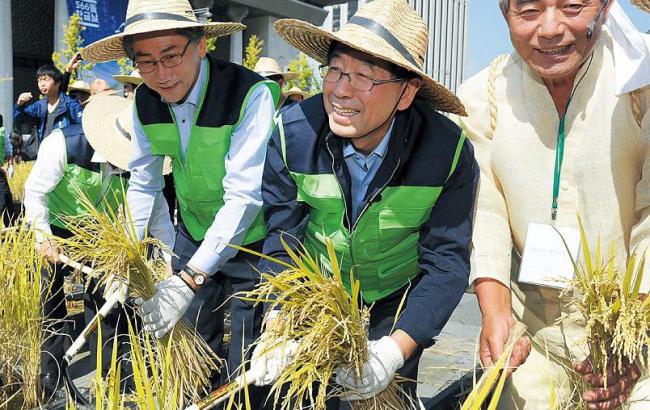 |
Seoul Mayor Park Won-soon (center) participates in a rice harvesting event on Oct. 8. Seoul City started growing rice at Seoul Plaza, central Seoul, in June. (Seoul Metropolitan Government) |
City planners in many countries are pushing urban farming to turn their cities into more pleasant and livable places.
Seoul Mayor Park Won-soon is one ardent advocate. In June, he declared the year 2012 as the beginning of an urban farming era, unveiling a plan to secure enough farming space in the highly congested capital for each household in the city to have a 3.3 square-meter veggie patch.
“I believe that urban farming can successfully take root in Seoul, all the more because it is such a densely populated concrete jungle,” he said, unveiling a 10-point plan to promote urban farming in June.
“Seoul can become the world’s No. 1 farm city.”
To achieve that goal, the city has allotted 2.4 billion won ($2.2 million) this year to various initiatives and projects, a 12-fold increase from last year’s 200 million won.
Seoul currently has virtually no agricultural sector. Only 1.5 percent of land is farmed, most of it in the city’s western rim near Gimpo.
Seoul plans to utilize vacant lots, rooftops of public buildings and even rent privately owned spaces to get local fresh produce growing in the city.
“The goal is to have every household be able to enjoy the joy of farming, which will also help build an urban community and add greenery,” said Song Im-bong, a director at Seoul Metropolitan Government’s urban farming department.
“It will also help improve the quality of life and create relevant business and jobs.”
There are around 170 public and privately owned farms in Seoul.
Additionally, the city runs 13 farms in the outskirts, including ones in Gwangju and Namyangju, both in Gyeonggi Province.
At publicly run farms, the city supports half of the rent fee for a plot and provides seeds and organic fertilizer for free. There, the use of chemical fertilizer and synthetic pesticides is prohibited.
Fifty-five rooftop gardens have been installed in the city so far and at least 15 more will be added soon.
“To overcome the limitation on surface space, the city plans to turn the roofs of schools, welfare facilities and kindergartens into gardens,” said Kwon Hyuk-hyun, a director at the city-run Seoul Agriculture Technology Center.
In another initiative to promote agriculture in the city, Seoul started earlier this year a weekly farmers’ market at Seoul Plaza in front of City Hall.
The outdoor market opens every Saturday until Nov. 17.
By Lee Sun-young and Kim Young-won
(
milaya@heraldcorp.com) (
wone0102@heraldcorp.com)








